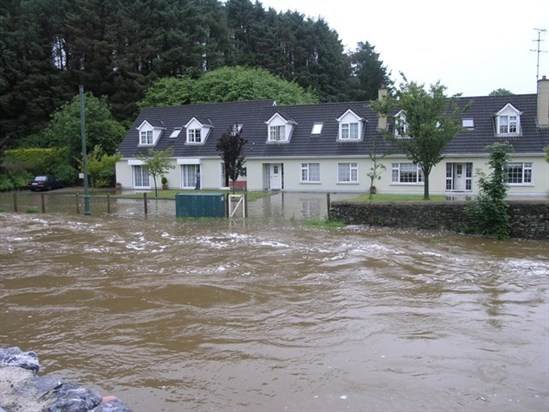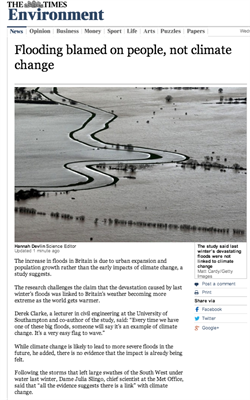This morning’s Times claims new research says the increase in flooding in Britain in recent times is due to urban expansion and population growth, rather than climate change.
According to the piece, this “does not agree” with warnings from scientists that climate change can be linked to recent flooding. But a quick look at the science shows a combination of land use and climate change is upping the risk of flooding in the UK.
“Misquote”
The Times story is based on a new study from the University of Southampton. The number of reported flooding events in the UK grew between 1884 to 2013, according to the research.
But although the number of reported floods went up, it’s mainly down to more people being exposed, the authors tell us. During that time, the population grew from 38.2 to 59.1 million.
If you remove the effect of population rise, there’s no clear increase in the number of reported flooding events, the report suggests. This is presumably where the Times draws its conclusion that the new research “rules out a link between last year’s winter flooding and climate change”.
The Times 20th August 2014
But the authors say this is not what they found. Andrew Stevens, co-author on the research tells us:
“[Our] work does not rule out a link between last year’s winter flooding and climate change as we did not look at physical data on the storms nor focus on any specific events. That is a misquote â?¦ We must be clear [our work] does not rule out climate change as a driver of flood risk”.
An important distinction is between the number of floods that get reported and how the risk of flooding is changing. The Southampton study looks at the first of those, not the second.
If you want to find out all the things affecting flood risk in the UK, the latest report from the Intergovernmental Panel on Climate Change (IPCC) is a good place to start.
Getting wetter
The IPCC expect a warmer atmosphere to lead to more extreme rainfall. On a national scale, there’s already evidence heavy rainfall events are getting more frequent in the UK due to climate change.
A recent study suggested the probability of seeing an extremely wet winter like we did this year is 25 per cent higher than it was before humans started influencing the climate.
Looking ahead, the image below shows the UK getting about 10 per cent more rainfall on average per year by the end of the century compared to 1986-2005, if emissions stay high (right). The left panel shows the difference under a strict emissions reduction pathway.
Under a high emissions scenario (RCP8.5), the UK is set to see about a 10 per cent rise in annual average rainfall by 2100 compared to the period 1985-2005 (right). Left panel shows RCP2.6. Source: IPCC 5th Assessment Report Sumary for Policymakers (p20).
There’s more to flooding than just heavy rainfall, however. So far there isn’t a clear pattern linking climate change to greater incidence of flooding on a global scale, according to the IPCC report.
But the picture in the UK is clearer. Scientists are confident a lot of rain falling in a short space of time raises flood risk, and the odds of that happening are increasing as the climate warms. As professor Richard Allan from Reading University told us recently:
“[W]henever we have heavy (and prolonged) rainfall events in the future, we can expect them to be more intense – along with the risk of flooding.”
A growing population
While scientists are confident heavier rainfall and sea level rise creates a greater risk of flooding, the biggest factor influencing the scale of damages will be a growing population.
According to one study, a combination of high emissions and population rise would expose an additional 250,000 to 400,000 people in Europe to river flooding by 2080 and potentially up to 5.5 million per year to coastal flooding.
The UK government’s Foresight Programme estimated three to four degrees warming above pre-industrial levels together with population change and concentrating people and assets in vulnerable areas could increase flood damage costs from 0.1 to 0.4 per cent of GDP.

Rising sea level due to climate change makes storm surges bigger and more likely to breach coastal defences.
Building on floodplains
The choices we make about land use can increase the flood risk too. Building on floodplains is a big problem, for example.
The government’s climate change advisor, the Committee on Climate Change (CCC), found in 2012 that England’s floodplains have seen more property development than other areas over the past ten years – and one in five of those properties is at risk of flooding.
Between 2001 and 2011, 200,000 homes were built in floodplains – and since the government came in, changes to planning regulations have made building in vulnerable areas easier.

Building on floodplains increases flood risk, the Committee on Climate Change warns.
Low natural drainage
Paving over soil could be exacerbating the problem, because rainwater is falling on concrete rather than being soaked up by the ground. The IPCC report highlights why soil is so important for keeping flood waters at bay, especially in urban areas. It says:
“Maintaining soil water retention capacity â?¦ contributes to reduce risks of flooding as soil organic matter absorbs up to twenty times its weight in water”
Preserving or developing natural drainage – which involves taking advantage of trees, plants and soil to manage where water flows and gets absorbed – can help prevent floods.
Resilience building
Adaptation measures to increase our resilience to extreme rainfall and flooding can make a difference by bolstering coastal defences, for example. But emissions will also need to come down to limit the extent of future risk.
In the meantime, recent events demonstrate the risks of not being prepared for these events when they strike.
————
Update 20th Aug 2014 14:40pm: Since publication of this blog The Times piece updated its article, removing the text saying author Derek Clarke had "ruled out a link between last winter's devastating floods and climate change. However, the Met Office does not agree".



